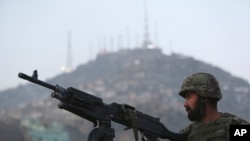Top officials from neighboring Pakistan and China gathered in Kabul Monday for the first round of a trilateral dialogue with Afghan counterparts to promote peace and stability in Afghanistan. The meeting comes as officials in southern Afghanistan say a drone strike killed a senior Taliban-turned Islamic State commander.
Senior Foreign Ministry diplomats from the three countries led their delegations in what Afghan officials described as “an in-depth exchange of views” on the regional situation.
Afghan Foreign Ministry spokesman Ahmad Shakeb Mustaghani told VOA Monday’s discussions focused on practical steps Pakistan and China can take to bolster peace and reconciliation efforts in Afghanistan.
“The three sides agreed to make concerted efforts in maintaining peace and stability in Afghanistan and the region," Mustaghani said. "China and Pakistan reiterated their support for the Afghan-led, Afghan-owned peace and reconciliation process and the efforts made by the Afghan government in this regard.”
China has long limited its involvement in Afghanistan to economic investment, but safety concerns hampered progress over the past decade. Beijing has in recent months, however, intensified its Afghan diplomacy and been encouraging regional countries to help the Afghan peace and stability process.
A delegation representing the Taliban insurgency recently visited China where it held talks with Chinese officials, but few details were made available to the media by either side.
While confirming the interaction, the Taliban insisted China’s role will be important when the insurgent group decides to engage in peace talks with Kabul.
Beijing’s interaction with the Taliban stems from safety concerns for Chinese investment and citizens working in Afghan areas where insurgents are more active. China is also worried that continued instability in Afghanistan will strengthen extremists who could fuel the Uighur Muslim insurgency in the Chinese Xinjiang border region.
Meanwhile, Afghan officials on Monday confirmed the killing of a Taliban commander who recently announced allegiance to the Islamic State. The country’s intelligence agency, the National Directorate of Security, identified the man as Abdul Rauf, also known as "Khadim," saying he was an Islamic State commander in southern Afghanistan.
This is the first time Afghan authorities have acknowledged the presence of the Middle Eastern extremist outfit in Afghanistan.
The reported attempts by the Islamic State to extend its influence in Afghanistan and Pakistan, analysts say, appears to be behind Islamabad’s increased contacts with Kabul to enhance counterterrorism cooperation.
Pakistan’s military has been battling the anti-state Pakistani Taliban in volatile border areas near the Afghan border and reports of some Taliban splinter groups joining hands with IS have raised alarms among Pakistani leaders.




